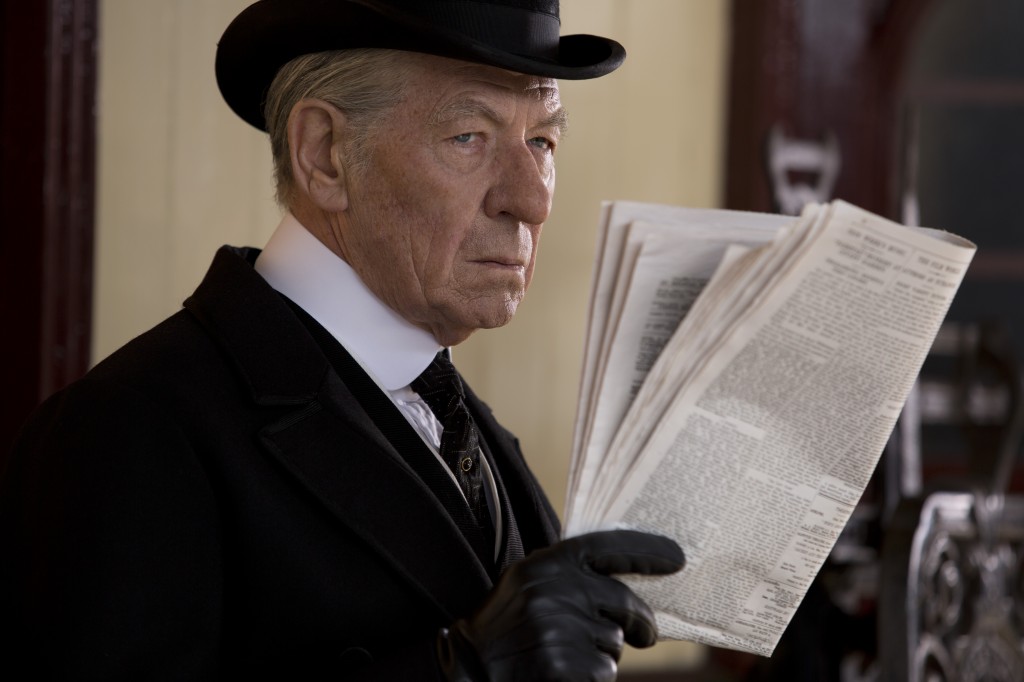
‘Mr. Holmes’ movie review
By Adam Tatelman, Staff Writer
4/5
Ever since Sir Arthur Conan Doyle published A Study In Scarlet in 1887, each next generation has reinvented the famous Sherlock Holmes to fit its time. He’s been a spy hunter in Basil Rathbone films like The Spider Woman, a self-parody in The Private Life of Sherlock Holmes or Without a Clue, a Hollywood action star played by Robert Downey Jr. and a Tumblr icon thanks to BBC’s Sherlock. One wonders where else to go from there, but somehow, Bill Condon’s Mr. Holmes offers an entirely new vision of the eternal sleuth: a 93-year-old Holmes (played by Sir Ian McKellen)—that of a mere mortal.
Though newcomers may be put off, the premise should intrigue Holmes fans at once. This time, rather than confronting the devious Professor Moriarty, Holmes must face a foe more devilish than any he has come up against before: mortality. He has been retired for years, keeping to the company of his bees instead of people. As the end approaches, he grows senile, struggling to remember the details of his final case, hoping to share its true account before he dies.
Holmes forms a bond with Roger (Milo Parker), his housekeeper’s son. The boy is precocious, and a great fan of Holmes’ work. He endeavors to help his idol write that final story. His mother (Laura Linney) knows Holmes’ end is near and wants to protect her son from that loss, but it is also her duty to care for the aged detective. This dynamic could easily have become melodramatic, but the actors understate their performances just enough to make the pseudo-family conflict real and affecting without feeling forced.
The wise child archetype is well worn, but young Parker manages to define the role well beyond being just a kid sidekick for Holmes. He holds his own on screen with McKellen, which is an incredible achievement for any child actor. I wouldn’t be surprised if Parker looks back on Mr. Holmes as his big break 10 years from now.
Fans may recognize the film’s premise from Mitch Cullin’s novel A Slight Trick of the Mind, in which the infirm Holmes intermittently flashes back to the events of his last case. The film keeps this narrative approach. Normally I dislike films that jump back and forth across time, but this one feels appropriate due to its tight focus on the small cast and plausible thematic reasons for each flashback. It also works because of Holmes’ senility: we get the backstory in fits because that’s how he remembers it. It puts the audience in his head, so to speak.
This movie’s tagline is “The Man Beyond the Myth,” and this Holmes is appropriately a celebrity in hiding. In this film, he’s every bit the cultural icon he is in real-life UK culture, thanks to the dramatic embellishments provided in Dr. Watson’s publications. Holmes’ distaste for the deerstalker cap, which he never wore in the novels, is one of the many gags Holmes fans will enjoy. There’s a particularly entertaining scene where an incognito Holmes watches a film adaptation of his final case, cringing at each artistic liberty taken. The fictionalized Holmes is played by Nicholas Rowe, which is a sly treat since he once played the detective in Barry Levinson’s Young Sherlock Holmes.
McKellen plays Holmes at three different ages and his attention to detail shines through all the subtle tweaks from one time to the next. The stately Holmes of middle age and the infirm wreck are immediately recognizable as the same person, yet their movements alone convey much history.
This film is not a traditional Holmes story. It’s not really even a mystery. It’s an indie-flick meditation on the conflict between fantasy and reality, between pure logic and emotional intelligence. It feels like it was made mostly—perhaps only—to showcase McKellen, but I don’t have a problem with that.
Folks other than Holmes fans may not enjoy the film’s premise as much, but the performances are well worth the price of admission.

